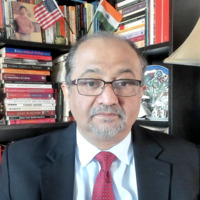
Nora Fisher Onar
Nora Fisher-Onar is Associate Professor and Chair of International Studies at the University of San Francisco. Her research interests include IR theory, foreign policy analysis, comparative politics/area studies (Middle East, Europe, Eurasia), religion and politics, gender, history/memory, and legacies of empire/colonialism. She is also increasingly interested in the impact of digital transformation on all of the above.
Fisher-Onar eceived a doctorate in IR from Oxford and holds masters and undergraduate degrees from Johns Hopkins (SAIS) and Georgetown universities, respectively.
She is the author of "Contesting Pluralism(s): Islamism, Liberalism and Nationalism" (Cambridge University Press, in-press/2024) and lead editor of the critically well-received volume, "Istanbul: Living With Difference in a Global City "(Rutgers University Press, 2018). She has published extensively in academic journals like the Journal of Common Market Studies (JCMS), Conflict and Cooperation, Millennium, Theory and Society, Qualitative and Multi-Method Research, Women’s Studies International Forum, and Middle East Studies.
Fisher-Onar also contributes policy commentary to the Washington Post, Foreign Affairs, the Guardian, and OpenDemocracy, and fora like Brookings, Carnegie, and the German Marshall Fund (GMF). At the GMF she has served as a Ronald Asmus Fellow, Transatlantic Academy Fellow, and Non-Residential Fellow. Fisher-Onar, who speaks five languages, has traveled to over 80, and lived in eight countries.
Fisher-Onar eceived a doctorate in IR from Oxford and holds masters and undergraduate degrees from Johns Hopkins (SAIS) and Georgetown universities, respectively.
She is the author of "Contesting Pluralism(s): Islamism, Liberalism and Nationalism" (Cambridge University Press, in-press/2024) and lead editor of the critically well-received volume, "Istanbul: Living With Difference in a Global City "(Rutgers University Press, 2018). She has published extensively in academic journals like the Journal of Common Market Studies (JCMS), Conflict and Cooperation, Millennium, Theory and Society, Qualitative and Multi-Method Research, Women’s Studies International Forum, and Middle East Studies.
Fisher-Onar also contributes policy commentary to the Washington Post, Foreign Affairs, the Guardian, and OpenDemocracy, and fora like Brookings, Carnegie, and the German Marshall Fund (GMF). At the GMF she has served as a Ronald Asmus Fellow, Transatlantic Academy Fellow, and Non-Residential Fellow. Fisher-Onar, who speaks five languages, has traveled to over 80, and lived in eight countries.
less
Related Authors
Muqtedar Khan
University of Delaware
Naim Kapucu
University of Central Florida
Edith Szanto
University of Alabama - Tuscaloosa
David Seamon
Kansas State University
Remo Caponi
University of Cologne
Armando Marques-Guedes
UNL - New University of Lisbon
Noe Cornago
University of the Basque Country, Euskal Herriko Unibertsitatea
George Lawson
The Australian National University
Olivier COSTA
Sciences Po, Paris
Mauro Grondona
University of Genova
InterestsView All (8)










Uploads
Papers by Nora Fisher Onar
Global Studies Quarterly
In this introduction to a special forum for Global Studies Quarterly, we push back against the combative view of nascent multipolarity as a new "great game", proposing instead the notion of "itenerant translation" as a framework for learning relationally across regional experiences.
The exercises in itinerant translation across the interlocking regional worlds of Afro-Eur-Asia on offer in this special forum likewise reveal the globe as a pluriversal space where multiple realities can and do coexist (and always have).
Invoking three visions of the international system as envisaged in realism (billiard balls), liberalism (concentric circles), and global IR (which I conceptualize as a Venn diagram), I argue that the last best captures (Turkey's) challenges and opportunities. My contention is that global IR incorporates constructivist claims regarding historical and social forces in world politics, but also decenters Eurocentric notions of history and society. A timely way to read multipolarity, the approach supports relational learning regarding our overlapping challenges as humanity.
Scholars in and of Turkey arguably have a comparative advantage in this space. This is due to their ability, albeit not always actualized, to read the world in plural terms-the epistemological equivalent of Turkey's proverbial bridging role in world politics.
EU foreign policy including relations with the Middle East and North Africa (MENA) is often characterized as liberal with an emphasis on democracy and human rights promotion, aid and trade through multilateral fora. Yet, many MENA-watchers question this framing, noting the preference for stability over freedom which informs much EU and member states policies—an approach commensurate with realism. In this chapter, I suggest that while both reflexes are present in EU-Middle East relations, liberalism and realism alike are informed by legacies of colonialism. Engaging an interdisciplinary reservoir of postcolonial thought, I offer tools with which to conceptualize colonial inheritances and the (violent and asymmetrical) co-constitution of ‘Europe’ and the ‘Middle East’. I then apply Fisher-Onar and Nicolaïdis’s (2013) three analytical moves—provincializing, engagement, and reconstruction—which are also inspired by postcolonial theory. The argument is that relations can be improved by provincializing liberalism and realism, and engaging alternative perspectives which are mindful of colonial legacies of co-constitution.
Keywords: EU, Europe, Middle East, MENA, colonialism, postcolonialism, decoloniality, créolité, hybridity, labor, women, Islamists
Today’s TIS 2.0, the piece shows, emerged in 2015 out of the AKP’s contingent electoral alliance with the right-wing Nationalist Action Party (Milliyetçi Hareket Partisi MHP). This marriage of convenience nonetheless informed key outcomes like the switch from a parliamentary system to an executive presidency, and a revisionist foreign policy. I then identify the core ideological features of the TIS 2.0 and their domestic, cultural and foreign policy implications. Next, I excavate antecedents in the TIS 1.0 of the 1980s, and the authoritarian, ethno-nationalist regime of the early 1940s.
Recognizing such continuities, in turn, opens the eye to an important historical pattern and the key takeaway from this article: the ascendance of assertive Turco-Muslim nationalism also engenders oppositional coalitions across the heterogeneous country which, given the right conditions, reinstate more pluralist policies.
In a nutshell, the May elections were NOT about "Islamists vs. secularists" nor is Turkey's illiberal turn something exceptional...
it was about would-be pluralizers vs. extreme nationalists, and anyone concerned about rising, populist / ultra-nationalist coalitions needs to pay attention to how and why the latter won.
Open access link & pdf included: https://www.e-ir.info/2023/05/31/pluralism-vs-ultra-nationalism-the-real-cleavage-behind-turkeys-elections-and-populisms-rise/
Global Studies Quarterly
In this introduction to a special forum for Global Studies Quarterly, we push back against the combative view of nascent multipolarity as a new "great game", proposing instead the notion of "itenerant translation" as a framework for learning relationally across regional experiences.
The exercises in itinerant translation across the interlocking regional worlds of Afro-Eur-Asia on offer in this special forum likewise reveal the globe as a pluriversal space where multiple realities can and do coexist (and always have).
Invoking three visions of the international system as envisaged in realism (billiard balls), liberalism (concentric circles), and global IR (which I conceptualize as a Venn diagram), I argue that the last best captures (Turkey's) challenges and opportunities. My contention is that global IR incorporates constructivist claims regarding historical and social forces in world politics, but also decenters Eurocentric notions of history and society. A timely way to read multipolarity, the approach supports relational learning regarding our overlapping challenges as humanity.
Scholars in and of Turkey arguably have a comparative advantage in this space. This is due to their ability, albeit not always actualized, to read the world in plural terms-the epistemological equivalent of Turkey's proverbial bridging role in world politics.
EU foreign policy including relations with the Middle East and North Africa (MENA) is often characterized as liberal with an emphasis on democracy and human rights promotion, aid and trade through multilateral fora. Yet, many MENA-watchers question this framing, noting the preference for stability over freedom which informs much EU and member states policies—an approach commensurate with realism. In this chapter, I suggest that while both reflexes are present in EU-Middle East relations, liberalism and realism alike are informed by legacies of colonialism. Engaging an interdisciplinary reservoir of postcolonial thought, I offer tools with which to conceptualize colonial inheritances and the (violent and asymmetrical) co-constitution of ‘Europe’ and the ‘Middle East’. I then apply Fisher-Onar and Nicolaïdis’s (2013) three analytical moves—provincializing, engagement, and reconstruction—which are also inspired by postcolonial theory. The argument is that relations can be improved by provincializing liberalism and realism, and engaging alternative perspectives which are mindful of colonial legacies of co-constitution.
Keywords: EU, Europe, Middle East, MENA, colonialism, postcolonialism, decoloniality, créolité, hybridity, labor, women, Islamists
Today’s TIS 2.0, the piece shows, emerged in 2015 out of the AKP’s contingent electoral alliance with the right-wing Nationalist Action Party (Milliyetçi Hareket Partisi MHP). This marriage of convenience nonetheless informed key outcomes like the switch from a parliamentary system to an executive presidency, and a revisionist foreign policy. I then identify the core ideological features of the TIS 2.0 and their domestic, cultural and foreign policy implications. Next, I excavate antecedents in the TIS 1.0 of the 1980s, and the authoritarian, ethno-nationalist regime of the early 1940s.
Recognizing such continuities, in turn, opens the eye to an important historical pattern and the key takeaway from this article: the ascendance of assertive Turco-Muslim nationalism also engenders oppositional coalitions across the heterogeneous country which, given the right conditions, reinstate more pluralist policies.
In a nutshell, the May elections were NOT about "Islamists vs. secularists" nor is Turkey's illiberal turn something exceptional...
it was about would-be pluralizers vs. extreme nationalists, and anyone concerned about rising, populist / ultra-nationalist coalitions needs to pay attention to how and why the latter won.
Open access link & pdf included: https://www.e-ir.info/2023/05/31/pluralism-vs-ultra-nationalism-the-real-cleavage-behind-turkeys-elections-and-populisms-rise/
Description on Amazon: https://www.amazon.com/Contesting-Pluralism-Islamism-Liberalism-Nationalism/dp/1108838707
Contesting Pluralism(s) challenges a widespread tendency to limit studies of Turkish – and Muslim – politics to 'Islamist vs. secularist' or 'Islam vs. democracy' debates. Instead, Nora Fisher-Onar's innovative argument centers on coalitions for and against pluralism. Retelling Turkey's story from the late Ottoman Empire to the present as a tale of pluralizing vs. anti-pluralist coalitions, this book offers an alternative explanation for major outcomes from elections and coup d'etats to revolutions. Here, cross-camp alliances pit those who are willing to coexist with 'Other(s)' against those who champion a unitary, national project in which everyone speaks, believes, looks, and loves as they do. Drawing on a rich array of primary and secondary data, Fisher-Onar introduces an analytical framework for capturing causal complexity in political contestation. This study rejects Orientalist exceptionalism, rereading the relationship between political religion, pluralism, and populism via a framework that travels across and beyond the Muslim-majority world.
Beyond simplified notions of enforced harmony or dynamic dissonance, this book aims at a more polyphonic analysis of the various voices of Habsburg and Ottoman multinationalism: from the imperial centres and in the closest proximity to sovereigns, to provinces and minorities, among intellectuals and state servants, through novels and newspapers. Combining insights from history, literary studies and political sciences, it further explores the lasting legacy of the empires in post-imperial narratives of loss, nostalgia, hope and redemption. It shows why the two dynasties keep haunting the twenty-first century with fears and promises of conflict, coexistence, and reborn greatness.
Myths and Narratives of Habsburg and Ottoman Multinationalism 1848–1918
1–3 November 2018, Copenhagen
While some denounce the legacies of colonialism they discern in the EU’s practices and discourse,
others believe these accusations to be unfounded, raising the question: how apt is the analogy
between the 19th-century standard of civilisation and the EU’s narratives and modes of actions
today? In this essay, we address the question by developing a ‘new standards typology’ articulated
around two axes: agency denial and hierarchy. These refer respectively to the unilateral shaping of
standards applicable to others, and to the salience of Eurocentricism in the way the standards are
enforced and structure the international system. Ultimately, we argue that in transforming their
‘continent’ from a metropolis to a microcosmos – from a cluster of colonial capitals to an EU
that contains many of the world’s tensions within itself – Europeans have only partially succeeded
in transcending their colonial impulses. We conclude by suggesting that the EU’s relevance is
grounded in its ability to become a post-colonial power, and that to achieve this, those acting in
its name need to remember historical legacies and reflect upon the ‘standards’ that inspire their
action.